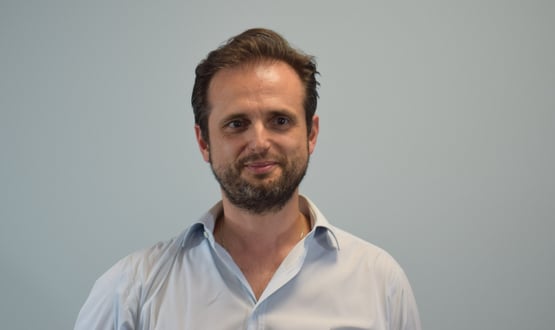Industry Spotlight: Harry Lykostratis, founder and managing director, Open Medical
- 9 June 2022

When orthopaedic doctor Harry Lykostratis spotted a problem in his department, it was natural he turned to digitisation to solve it – he’s been developing software since his teens. In our latest Industry Spotlight, Claire Read speaks to the founder and managing director of Open Medical to find out more.
Harry Lykostratis glanced up at the whiteboard on which the trauma list always appeared. There, in marker, was the list of patients of which he was taking charge this weekend – the list of patients who needed emergency attention from an orthopaedic surgeon, and the order in which they were to be operated on.
At least, the list had been there the night before. It seemed that, since then, a cleaner had visited the department and wiped the board.
“There was no other record of that list,” remembers Lykostratis. “We couldn’t recover it.”
It was then that a very clear thought occurred to him. “There must be a better way to do this.”
A program, of course
To know Lykostratis’ history is to know that it’s inevitable his next thought was digitisation and computers. Because long before Lykostratis was an orthopaedic surgeon, he was a software developer.
He taught himself programming as a teenager, selling his first piece of software to a car dealership. (“I sold it for an embarrassingly low figure,” he says with a laugh. “But to me it was significant.”)
That Saturday with the whiteboard therefore quickly led him to build a piece of software. eTrauma was created in 2011 to enable electronic planning of trauma lists. Initially it was just installed in Lykostratis’ own department, but word started to spread.
“I ended up installing in four trusts,” he remembers. “But after the fourth installation, it became obvious I could not sustain it. At that point, most of my weekend was going around to install updates. The software began to manage a little bit more than the trauma list and started getting a life of its own.”
In 2017, he decided to go part time with his clinical practice and dedicate more time to what increasingly looked like a viable business. Open Medical has since grown to employ 40 staff and has its products deployed at over 100 NHS sites.
The administrative side of a clinical outcome
The experience of developing eTrauma has now informed the creation of Pathpoint, which can cover workflow planning and management across all specialties.
“We are concentrating on the administrative side of a clinical outcome,” explains Lykostratis. “It’s about managing patient flow and automating the administration.”
He feels this is of prime importance to clinicians, suggesting they are more interested in “digitising workflow” than “digitising the patient record per se, although that is an important foundation”. And, to be fair, he has plenty of opportunity for market research: Lykostratis continues to practise a few hours each week as a doctor, which he says helps inform his software development.
“I know what expectation [from a clinical user] is reasonable and what is unreasonable. I understand where accessibility, usability, security and information governance comes in, where performance comes in. So, I can make a decision about whether something that I think might be useful is a good idea to do, because I can understand the implications of that for the performance of the system as well as for clinical safety.”
The software developer as doctor
Interestingly, he says the influence flows the other way too – his experience as a software developer informs his practice as a doctor.
“You develop a very systematic way of thinking in software engineering,” he says. “I would say 40% of writing software is thinking about how you’re going to approach it, 10% of the time is writing it, and then 50% is debugging it.
“And clinical practice is not that dissimilar really. Whether you do surgery or a consultation leading to a clinical decision, it is in essence about how you approach it, and doing it, and then debugging it.
“Debugging is, I think, is a skill that you have to learn in life,” he adds. “Much of what we do is about dealing with a consequence of what we did and I think having the understanding that you will have to debug makes it easier for you to do so. And I think it does apply to how do you approach clinical decision making.”
Unsurprisingly, then, when asked if he’d like to see more doctors follow his lead and combine software development with medicine, Lykostratis offers an unequivocal response: “Yes, absolutely.”
“It would be great to see computer science classes at medical school, and create the role the clinical informatician as its own sort of specialty in a way.
An old debate
“That would take time,” he admits. “But what we can do now is involve more in transformational roles. And not just doctors – any practising health professional, or any administrative professional who interacts with patients.”
With that said, he’s not convinced that any of this should be synonymous with NHS organisations undertaking widespread software development. And, in any case, he feels this is a debate which is becoming less relevant.
“That’s because I think that technology at this stage allows us to create separation between the data and the software,” Lykostratis says. “I think the organisation should absolutely sit at the level of the data model, they should be gathering the information and the metrics. I think NHS IT should have good data scientists, and I think they need to be in full control of the data.
“But do I think it’s useful for the same organisation to be implementing user experience? I don’t think it’s efficient, personally, because it’s very hard to keep up. If we start thinking about the electronic health record [as an example], it’s software and a concept. The NHS organisation needs to control the concept. The software should be left to the people whose job it is to write and maintain it.”
Plans for the future
Of which Lykostratis, of course, is one – and one with big plans. OpenMedical is, he says, heavily investing in research and development. “We are looking into artificial intelligence and automation in a lot of the workflows.”
There is also focus on supporting organisations, including those outside of the UK, to make the most of the company’s products. “We have a heavy consultancy role because workflow has to be locally sensible, and it has to be domain adjustable,” explains Lykostratis.
“So we’re trying to find ways to scale up our operational or service side, so employ project managers and transformation consultants so we can deploy more and faster. And we are definitely looking into outside markets, in Europe and North America.
“We’re trying to be conservative and not overreach with that,” he emphasises. “But I think in a lot more places we can supplement the electronic record with better or more streamlined workflow management.”
And with absolutely no need for a whiteboard.
Contact Open Medical:
Website: www.openmedical.co.uk
Twitter: @OpenMedicalLtd, @HLykos
LinkedIn: Open Medical, Harry Lykostratis
Phone: 020 347 5295
Email: info@openmedical.co.uk





